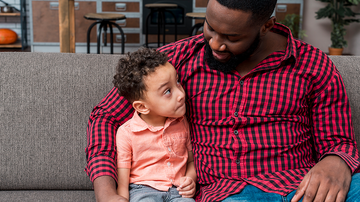As a parent/guardian, it’s important to talk to your children about race. This conversation is essential for raising an empathetic and aware individual who can understand and accept diversity in their lives. These conversations should not be ignored or left out of family conversations as it provides the opportunity to explain the differences that exist in the world and can help them understand and appreciate the diversity of people around them.
One way to start this conversation with your children is by reading books that feature characters of different races and ethnicities. There are many wonderful children's books available that celebrate diversity and promote empathy and understanding. These books can be a great way to introduce your children to different cultures and traditions, as well as help them develop a sense of empathy and compassion for people who are different from them.

Here are 10 effective ways to talk to your children about race and why it’s so important.
1. Start Early - Racial awareness begins at a very young age, before kids even have words for it. Therefore, it is important to start having these conversations early on in order to lay the foundation for future discussions. Even if your child does not fully understand, exposing them to different races will help them become more comfortable with diversity later in life.
2. Make It Natural - When talking about race, make sure you are doing so naturally and without judgement or prejudice. Talk openly and honestly with your child about different races, cultures, and backgrounds without making any assumptions or using stereotypes in the process.
3. Ask Questions - Encourage your child to ask questions about different races so you can provide them with accurate information that is free from bias or preconceived notions that they may have heard elsewhere. Talk through their thoughts and answer any questions they may have honestly and carefully while providing appropriate context when necessary.
4. Discuss How We Treat Others - In addition to teaching your children how to talk about different races, it’s just as important—if not more—to discuss how we should treat others who are different than us (i.e., people of other races). Encourage empathy towards those who may look or act differently than us by engaging in activities such as role-playing scenarios or asking open-ended questions that allow for further discussion into this topic area.
5. Lead By Example - A great way for parents to show their kids how we should treat those who are different from us is by leading by example both at home and outside of the home (i.e., at school or work). Showing kindness towards others regardless of their background will send a strong message of acceptance that will hopefully be mirrored by your children as well!
6 . Utilise Media & Books - Incorporating books, films, television shows, articles, etc., into conversations about race can help bring certain topics alive for your children while also helping them learn more about what it means to be diverse in today's world . Look for stories that feature characters from various backgrounds so they can begin seeing themselves represented accurately in literature/media outlets instead of feeling like an "other".
7 . Be Willing To Listen & Learn - Finally, remember that learning about race is a two-way street—you should be willing to listen as much as you speak during these conversations with your kids. Be open-minded when discussing topics related to race & ethnicity, while also being willing & eager to learn new things alongside your child throughout these experiences!
Talking openly with your children about race is one of the most important tasks parents have today—it’s critical that our kids learn from us how respect all individuals regardless of skin colour or background and create a society where everyone feels accepted & appreciated for their unique contributions! By utilizing some of these tips above, parents can ensure they are having productive, meaningful conversations with their kids on this topic!




